

(Download a higher resolution picture by clicking on any
picture below.) 
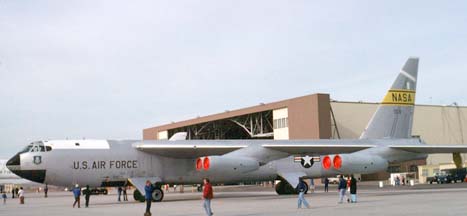 The yellow NASA tailband had been
applied to the NB-52B when it
appeared at the November 13, 1977 Edwards AFB Open House.
Photographer: Brian Lockett.
The yellow NASA tailband had been
applied to the NB-52B when it
appeared at the November 13, 1977 Edwards AFB Open House.
Photographer: Brian Lockett.
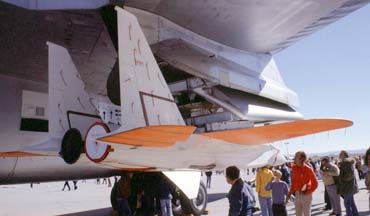 A 3/8-scale F-15 Remotely Piloted Research
Vehicle was displayed on the pylon of the NB-52B at the
November 12, 1978 Edwards AFB Open House. During the flight test
program of the F-15, the F-15 RPRV was used to perform dangerous
flight maneuvers, particularly spins, without putting a human
pilot at risk. Initially the drone was recovered by helicopter
after deploying a parachute. There were a couple of times when
the helicopter failed to snag the RPRV. Even though it was
suspended from a parachute, the vertical velocity at landing
resulted in significant damage to the drone. A retractable skid
landing gear was installed, and subsequent flights were flown to
a landing on the dry lakebed by the RPRV's remote pilot.
Photographer: Brian Lockett.
A 3/8-scale F-15 Remotely Piloted Research
Vehicle was displayed on the pylon of the NB-52B at the
November 12, 1978 Edwards AFB Open House. During the flight test
program of the F-15, the F-15 RPRV was used to perform dangerous
flight maneuvers, particularly spins, without putting a human
pilot at risk. Initially the drone was recovered by helicopter
after deploying a parachute. There were a couple of times when
the helicopter failed to snag the RPRV. Even though it was
suspended from a parachute, the vertical velocity at landing
resulted in significant damage to the drone. A retractable skid
landing gear was installed, and subsequent flights were flown to
a landing on the dry lakebed by the RPRV's remote pilot.
Photographer: Brian Lockett.
.
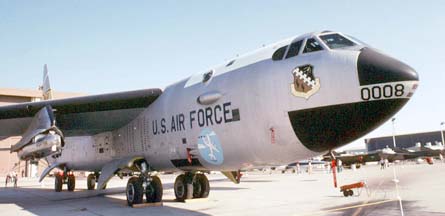 The NB-52B appeared at the October
5, 1980 Edwards AFB Open House fitted with the High
Manueverability Aircraft Technology (HiMAT) adapter on the X-15
pylon. The HiMAT research vehicles were flown from mid 1979 to
January 1983 demonstrated the use of composites, aeroelastic
tailoring, close-coupled canards, and winglets that could be used
in the development of future high performance military aircraft.
Photographer: Brian Lockett.
The NB-52B appeared at the October
5, 1980 Edwards AFB Open House fitted with the High
Manueverability Aircraft Technology (HiMAT) adapter on the X-15
pylon. The HiMAT research vehicles were flown from mid 1979 to
January 1983 demonstrated the use of composites, aeroelastic
tailoring, close-coupled canards, and winglets that could be used
in the development of future high performance military aircraft.
Photographer: Brian Lockett.
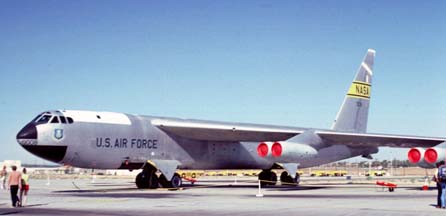 The NB-52B
on static display at the September 20, 1981 Edwards AFB Open
House. Photographer: Brian Lockett.
The NB-52B
on static display at the September 20, 1981 Edwards AFB Open
House. Photographer: Brian Lockett.
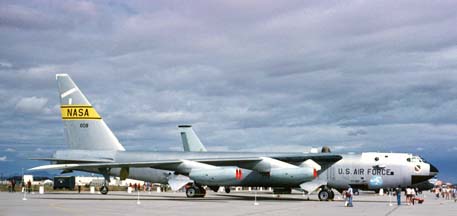 The NB-52B
on static display at the October 23, 1982 Edwards AFB Open House.
Photographer: Brian Lockett.
The NB-52B
on static display at the October 23, 1982 Edwards AFB Open House.
Photographer: Brian Lockett.
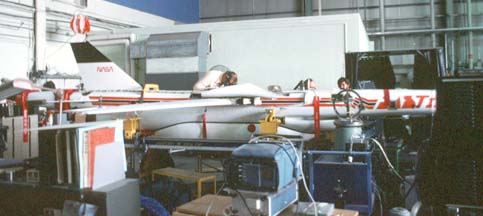 The Drone for Aeroelastic Structure
Testing (DAST) was based on a
Ryan Firebee drone. It is seen here in the NASA Dryden hangar on
January 6, 1983. It was equipped with smooth surfaced wings with
flexible skins and internal actuators instead of traditional
hinged, fixed-contour flight control surfaces. The intent was to
delay the onset of stall by eliminating discontinuities in the
surface contour of the wing, and to provide complete control over
wing camber to provide optimal lift at all speeds, altitudes, and
maneuvering conditions. Photographer: Brian Lockett.
The Drone for Aeroelastic Structure
Testing (DAST) was based on a
Ryan Firebee drone. It is seen here in the NASA Dryden hangar on
January 6, 1983. It was equipped with smooth surfaced wings with
flexible skins and internal actuators instead of traditional
hinged, fixed-contour flight control surfaces. The intent was to
delay the onset of stall by eliminating discontinuities in the
surface contour of the wing, and to provide complete control over
wing camber to provide optimal lift at all speeds, altitudes, and
maneuvering conditions. Photographer: Brian Lockett.
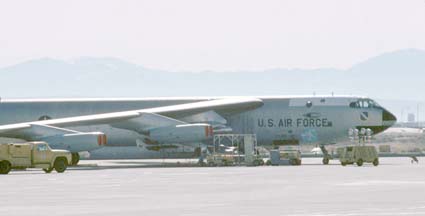 A HiMAT
drone is mounted on the NB-52B on January 6, 1983, shortly before
the last flight of the program. The two vehicles were flown a
total of 26 times during the three and one-half year program.
Photographer: Brian Lockett.
A HiMAT
drone is mounted on the NB-52B on January 6, 1983, shortly before
the last flight of the program. The two vehicles were flown a
total of 26 times during the three and one-half year program.
Photographer: Brian Lockett.
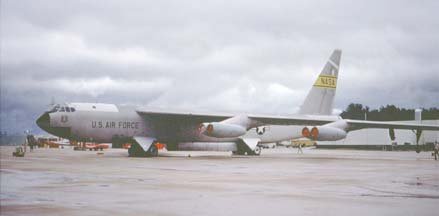 The NB-52B at
Edwards AFB in November of 1985. Photo by Cliff Bossie via Greg
Spahr.
The NB-52B at
Edwards AFB in November of 1985. Photo by Cliff Bossie via Greg
Spahr.
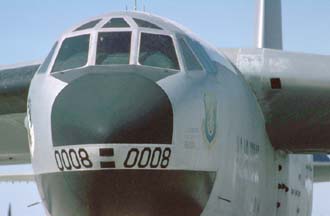 A long lens was used to take this
photo of the NB-52B at the
November 9, 1986 Edwards AFB Open House. Photographer: Brian
Lockett.
A long lens was used to take this
photo of the NB-52B at the
November 9, 1986 Edwards AFB Open House. Photographer: Brian
Lockett.
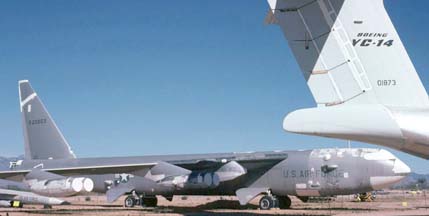 The NB-52A
survives in the Pima Air Museum near Tucson, Arizona. It is seen
here on November 24, 1986 adjacent to the Boeing YC-14.
Photographer: Brian Lockett.
The NB-52A
survives in the Pima Air Museum near Tucson, Arizona. It is seen
here on November 24, 1986 adjacent to the Boeing YC-14.
Photographer: Brian Lockett.
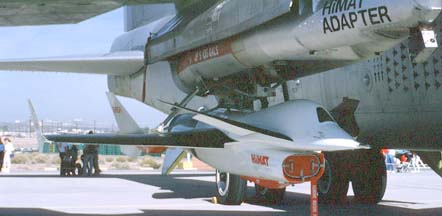 At the November 8, 1987 Edwards AFB
Open House, the NB-52B was displayed with a HiMAT drone attached to the
pylon, although the HiMAT program had ended over four years
earlier. Photographer: Brian Lockett.
At the November 8, 1987 Edwards AFB
Open House, the NB-52B was displayed with a HiMAT drone attached to the
pylon, although the HiMAT program had ended over four years
earlier. Photographer: Brian Lockett.
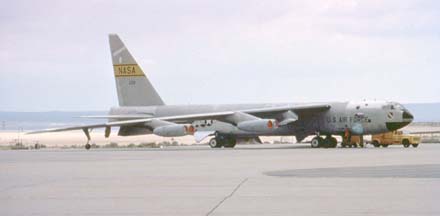 It was a cloudy day in May 1989 when this photo
was taken of the NB-52B on the
NASA Dryden flightline. Photo by Craig Kaston via Paul Minert and
Greg Spahr.
It was a cloudy day in May 1989 when this photo
was taken of the NB-52B on the
NASA Dryden flightline. Photo by Craig Kaston via Paul Minert and
Greg Spahr.
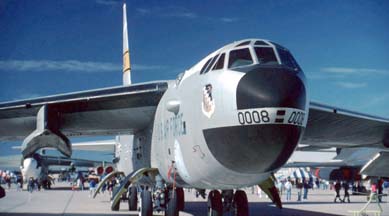 The NB-52B
on static display at the October 29, 1989 Edwards AFB Open House.
Photographer: Brian Lockett.
The NB-52B
on static display at the October 29, 1989 Edwards AFB Open House.
Photographer: Brian Lockett.
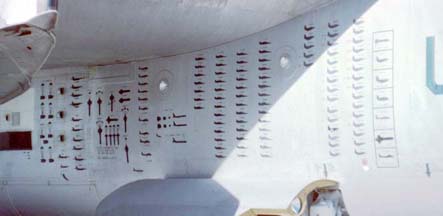 Close-up of the mission scoreboard
on the side of the NB-52B
shows the remarkable variety of programs that is has supported.
In addition to launching the aircraft depicted on these pages, it
has tested parachute recovery systems for the F-111 crew escape
module and the Space Shuttle solid fuel boosters. It has also
been used in wake-vortex testing and acted as an air to air
target. This photo was taken at the October 29, 1989 Edwards AFB
Open House. Photographer: Brian Lockett.
Close-up of the mission scoreboard
on the side of the NB-52B
shows the remarkable variety of programs that is has supported.
In addition to launching the aircraft depicted on these pages, it
has tested parachute recovery systems for the F-111 crew escape
module and the Space Shuttle solid fuel boosters. It has also
been used in wake-vortex testing and acted as an air to air
target. This photo was taken at the October 29, 1989 Edwards AFB
Open House. Photographer: Brian Lockett.
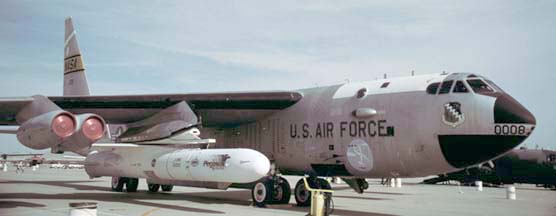 The NB-52B
became the world's first manned, winged, return to launch site
satellite launcher when it launched the Orbital Sciences' Pegasus
booster on April 5, 1990. It was displayed with a Pegasus at the
October 6, 1990 Edwards AFB Open House. Six Pegasus launches were
conducted by the NB-52B, and the last Pegasus launch from the
NB-52B took place on August 3, 1994. Photographer: Brian Lockett.
The NB-52B
became the world's first manned, winged, return to launch site
satellite launcher when it launched the Orbital Sciences' Pegasus
booster on April 5, 1990. It was displayed with a Pegasus at the
October 6, 1990 Edwards AFB Open House. Six Pegasus launches were
conducted by the NB-52B, and the last Pegasus launch from the
NB-52B took place on August 3, 1994. Photographer: Brian Lockett.
Pegasus launches are now conducted from a Lockheed L-1011.
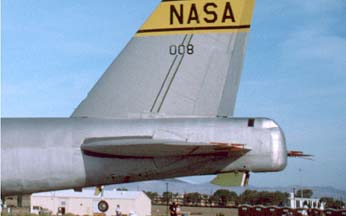 The NB-52B was also being used to
test the Space Shuttle Drag Chute
in 1990. The boxy structure under the empennage of the
stratofortress holds the drag chute mechanism. Photographer:
Brian Lockett.
The NB-52B was also being used to
test the Space Shuttle Drag Chute
in 1990. The boxy structure under the empennage of the
stratofortress holds the drag chute mechanism. Photographer:
Brian Lockett.
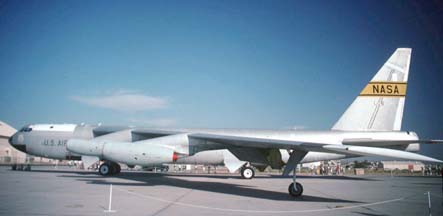 The NB-52B
on static display at the November 6, 1991 Edwards AFB Open House.
Photographer: Brian Lockett.
The NB-52B
on static display at the November 6, 1991 Edwards AFB Open House.
Photographer: Brian Lockett.
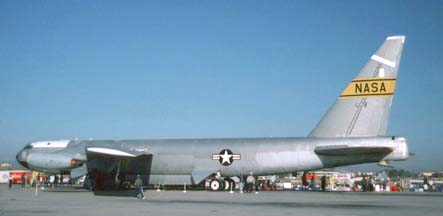 The NB-52B
on static display at the October 18, 1992 Edwards AFB Open House.
Photographer: Brian Lockett.
The NB-52B
on static display at the October 18, 1992 Edwards AFB Open House.
Photographer: Brian Lockett.
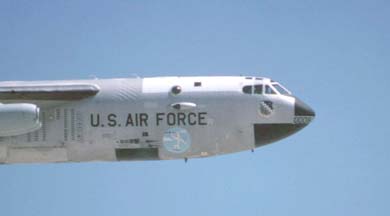 The NB-52B
is seen in flight over the NASA Dryden Flight Research Center on
the fortieth anniversary of its arrival at Edwards Air Force Base
on June 30, 1995. Photographer: Brian Lockett.
The NB-52B
is seen in flight over the NASA Dryden Flight Research Center on
the fortieth anniversary of its arrival at Edwards Air Force Base
on June 30, 1995. Photographer: Brian Lockett.
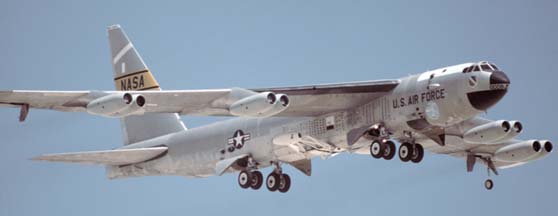 NB-52B, 52-0008 was equipped with
with a pair of J85 jet engines attached to a pallet in the bomb
bay on June 30, 1995.
NB-52B, 52-0008 was equipped with
with a pair of J85 jet engines attached to a pallet in the bomb
bay on June 30, 1995.
The NB-52B launched the X-15 #1 twenty-six times, the X-15 #2 fourteen times in its original configuration and fifteen times as the X-15A-2, and the X-15 #3 thirty four times. It launched the M2-F2 twelve times in its original configuration and twenty-seven times as the M2-F3. It launched the HL-10 thirty four times, the X-24A twenty-six times and the X-24B thirty-six times.
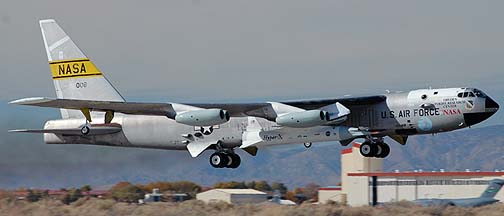 Boeing NB-52B
Stratofortress Mothership.
Boeing NB-52B
Stratofortress Mothership.
eBook edition of Balls Eight: History of the Boeing NB-52B Stratofortress Mothership |
||
|
My book Balls Eight: History of the Boeing NB-52B Stratofortress Mothership is now available as an eBook for just $10.99, a considerably reduced price compared to the print edition. It has been asserted that the Boeing NB-52B Stratofortress, carrying Air Force serial 52-0008, can lay claim to being the airplane that has seen and participated in more history than any other single airplane. For forty-five years, the NB-52B was a fixture at Edwards Air Force Base. While the NB-52B is most famous for launching the three North American X-15 rocket planes, it continued to serve in the role of launch platform for a multitude of programs until its final mission, launching the Mach-10 X-43A Hyper-X, on November 16, 2004. It was the oldest flying B-52 by nearly ten years. The eBook edition is profusely illustrated with vintage photographs and diagrams and has more pictures than the print edition. It can be dowloaded directly from Lulu.com. It will soon be available from Apple iBookstore, Amazon, Barnes & Noble, and Kobo. | ||
|
Balls Eight: History of the Boeing NB-52B Stratofortress Mothership |
||
It has been asserted that the Boeing NB-52B Stratofortress, carrying Air Force serial 52-0008, can lay claim to being the airplane that has seen and participated in more history than any other single airplane. For forty-five years, the NB-52B was a fixture at Edwards Air Force Base. While the NB-52B is most famous for launching the three North American X-15 rocket planes, it continued to serve in the role of launch platform for a multitude of programs until its final mission on November 16, 2004. It was the oldest flying B-52 by nearly ten years.The NB-52B launched the three X-15 hypersonic rocket planes.
It launched the Northrop HL-10, Northrop M2-F2/F3, Martin Marietta X-24A and Martin Marietta X-24B lifting bodies.
It simulated the steep, power off approach to landing used by the Space Shuttles.
It assisted in the collection of data about wake turbulence from large aircraft.
It served as an air-to-air gunnery target.
It launched 3/8-scale F-15 Remotely Piloted Research Vehicles (RPRV) and Spin Research Vehicles (SRV).
It launched a Ryan Firebee II drone and the Ryan Firebee based Drones for Aeroelastic Structures Testing (DAST).
It launched the Highly Maneuverable Aircraft Technology (HiMAT) RPRVs.
It dropped the 48,000-pound Space Shuttle Reusable Booster Drop Test Vehicle (SRB/DTV).
It released a simulated F-111 crew module from its bomb bay to evaluate new parachute recovery systems.
It was the first airplane to launch a satellite into orbit on the Orbital Sciences Pegasus booster.
It tested the drag chute used to decelerate space shuttle orbiters.
It tested pollution reducing fuel additives with a pair of jet engines mounted under its bomb bay.
It launched the X-38 Space Station Crew Return Vehicles.
It launched the X-43A Hyper-X Supersonic Combustion Ramjets.
The book is 200 pages long. It contains 246 color photographs, 89 black and white photographs, and 2 other illustrations.
You can preview the first several pages of the book.
Books are printed on demand by Lulu.com. When you order one, it is placed in your Lulu.com shopping cart. Lulu.com prints, packages, and ships the book direct to you.

Put a copy of the softcover edition of Balls Eight: History of the Boeing NB-52B Stratofortress Mothership in your Lulu.com shopping cart for $74.95.

Put a copy of the hardcover edition of Balls Eight: History of the Boeing NB-52B Stratofortress Mothership in your Lulu.com shopping cart for $79.95.
Revell has re-released Monogram's 1/72-scale Boeing NB-52B Stratofortress with X-15A-2 kit. You need this book to help you establish the appropriate paint scheme for any particular NB-52B mission that you want to model.
The book is 96 pages long.
You can preview the first several pages of the book.
Books are printed on demand by Lulu.com. When you order one, it is placed in your Lulu.com shopping cart. Lulu.com prints, packages, and ships the book direct to you.
 Put a copy of the softcover edition of Painting Guide for the Boeing Stratofortress Motherships in your Lulu.com shopping cart for $44.95.
Put a copy of the softcover edition of Painting Guide for the Boeing Stratofortress Motherships in your Lulu.com shopping cart for $44.95.
You can buy a 2020 calendar featuring photographs of the Boeing NB-52B Stratofortress Mothership that launched the X-15s in the 1960s and continued launching research vehicles until 2004.
It has been asserted that the Boeing NB-52B Stratofortress, carrying Air Force serial 52-0008, can lay claim to being the airplane that has seen and participated in more history than any other single airplane. This calendar features a dozen pictures of the NB-52B carrying some of the research vehicles that it launched over the years. Photo sources: Air Force, NASA, Richard Lockett, Brian Lockett:
North American X-15-1, 1960
North American X-15-3, 1963
North American X-15A-2, 1967
Northrop HL-10, 1969
Martin-Mariettta X-24A, 1970
Northrop M2-F3, 1972
Martin-Mariettta X-24B, 1973
Orbital Sciences Pegasus, 1989
Supersonic Supercruise, 1995
X-38 V-131R, 2000
X-43A Hyper-X, 2004
 Put a copy of the Balls Eight: Boeing NB-52B Stratofortress Mothership: 2020 calendar in your Lulu.com shopping cart for $14.95.
Put a copy of the Balls Eight: Boeing NB-52B Stratofortress Mothership: 2020 calendar in your Lulu.com shopping cart for $14.95.
- advertisement -
 Books about
Lifting Bodies, Edwards Air Force Base, and the X-15 available
from
Books about
Lifting Bodies, Edwards Air Force Base, and the X-15 available
from 
 Flying Without Wings : Nasa Lifting
Bodies and the Birth of the Space Shuttle by Milton O. Thompson
Flying Without Wings : Nasa Lifting
Bodies and the Birth of the Space Shuttle by Milton O. Thompson
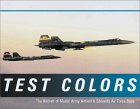 Test Colors: The Aircraft of Muroc Army Airfield
and Edwards Air Force Base by Rene Francillon
Test Colors: The Aircraft of Muroc Army Airfield
and Edwards Air Force Base by Rene Francillon
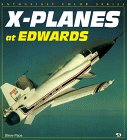 X-Planes at Edwards (Enthusiast Color
Series) by
Steve Pace
X-Planes at Edwards (Enthusiast Color
Series) by
Steve Pace
 Edwards Air Force Base : Open House at the USAF
Flight Test Center 1957-1966 : A Photo Chronicle of
Aircraft Displayed (Schiffer Military History) by Robert D. Archer
Edwards Air Force Base : Open House at the USAF
Flight Test Center 1957-1966 : A Photo Chronicle of
Aircraft Displayed (Schiffer Military History) by Robert D. Archer
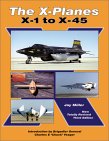 The X-Planes: X-1 to X-45: 3rd Edition
by Jay Miller
The X-Planes: X-1 to X-45: 3rd Edition
by Jay Miller
 Angle of Attack : Harrison Storms and the Race to
the Moon by Mike Gray. The biography of Harrison Storms, who
was instrumental in the development and operation of the X-15.
Angle of Attack : Harrison Storms and the Race to
the Moon by Mike Gray. The biography of Harrison Storms, who
was instrumental in the development and operation of the X-15.
 At the Edge of Space : The X-15 Flight Program
by Milton O. Thompson. The story of test flying the X-15 from the
point of view of the pilot.
At the Edge of Space : The X-15 Flight Program
by Milton O. Thompson. The story of test flying the X-15 from the
point of view of the pilot.
Send a message to Brian.
Go to home page of the Goleta Air and Space Museum.